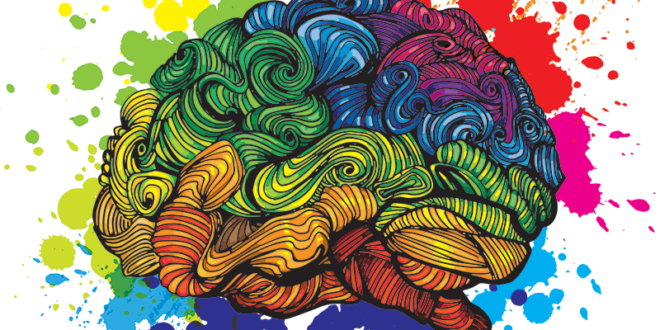Training Your Brain To Adopt Healthy Habits
Would you rather have a doctor say to you “Take your medicine and things should get better” — or have a doctor sit down with you and explain why you need it? Most of us would prefer the latter. In the next few hundred words, I will do my best to explain to you how your brain works and how you can actually develop healthier behaviors. I would like to reference Trifton, Gordon, and Mirsa– the authors of “Training Your Brain To Adopt Healthful Habits: Mastering The Five Brain Challenges (2019). A lot of what I am about to share comes from this very useful workbook.
Let’s begin with a mini course on the parts of our brain responsible for behaviors and habits. Our brain is an intricate network of neurons similar to a scanner. It is always assessing our environment looking for opportunities to improve our well-being. Opportunities are defined as experiences that provide you with reward or relief. These neurons contain the chemical messenger dopamine. The reward center is one of the principle producing areas of dopamine. We need dopamine because it helps us to focus, move, feel happy, etc. The dopamine produced in our reward center is responsible for our behaviors– not our mood. The “reward center” in our brain motivates our behavior to seek “reward” or “relief”. The reward may be a a glass of wine or avoiding something painful, like disapproval or conflict.
Think of the dopamine in your neurons like a metal detector looking for metal objects. Your dopamine receptors beep slowly until you come near a known opportunity for reward or relief. Once you sense that opportunity, your dopamine receptors beep faster and faster “encoding” the expected value of that opportunity.
If the opportunity provided you with reward or relief, your brain remembers that and will seek those opportunities out again.
Dopamine is very essential and necessary for survival; however, like anything “too much of a good thing” can be unhealthy. Drugs and chemicals like alcohol, nicotine, opioids, methamphetamines, caffeine, cocaine, and sugar can actually cause huge dopamine boosts and intense phasic firing. That dopamine spike and intensity causes people to seek out more–even if it is unhealthy for you.
Essentially, but not entirely, there are two parts of our reward system that compete for control over our behavior– the limbic system and the prefrontal cortex. Huge dopamine boosts favor our limbic system and make it difficult for our prefrontal cortex and other parts of our reward system to carry out healthy behaviors–ESPECIALLY if these parts of our brain have some deficiency to begin with. That deficiency may be genetic or it may have been caused by disease or trauma. When the limbic system has the advantage, you will carry out more behaviors that favor the “here and now”. When the prefrontal cortex dominates, you will carry out behaviors that benefit you in the future. The prefrontal cortex is responsible for “thinking through the consequences of the behavior” resulting in healthier behaviors.
So, in short, we need to develop the parts of our brain that can slow down the limbic system from dominating. We need to nourish and develop our prefrontal cortex and an area in our reward system called the nucleus accumbens. The nucleus accumbens’s job is to apply a “braking mechanism” to slow down the reward center so the prefrontal cortex can “have it’s say”. Many individuals who are predisposed to drug and alcohol addictions have “weak or not enough” of the neurons responsible for a “healthy brake system”.
So how do we repair these “brakes” in conjunction with development of our prefrontal cortex? Because I am trying to keep this under 800 words (which I am miserably failing at), I will share three of the five brain challenges I implement with my clients. 1. Learn to highly value behaviors that promote wellness and devalue behaviors that lead to poor health. 2. Enrich your life to tame the need for immediate gratification. When we are deprived of opportunities to make life better, we are programmed to compulsively search for immediate relief. 3. Enhance your resiliency to new threats and chronic stress. Stress increases our need for immediate gratification.
Each of these brain challenges requires you to do some significant personal work. I encourage you to learn what areas of your brain you need to develop and how to go about mastering each of these challenges. I can briefly share with you a few tools and the areas of the brain the tool develops.
The tools that develop the prefrontal cortex are tools that ask you to explore and challenge your current awareness, values, expectations, beliefs, goals, intentions, knowledge base, support system, etc. If you need guidance in this area, I highly recommend a life coach, therapist or a support group.
“Enriching your life” tames your need for immediate gratification and repairs and develops your prefrontal cortex and nucleus accumbens. Enriching your life through problem solving, social networking, healthy relationships, creativity, new hobbies, therapy, travel, communication and social skills are significant in neurogenesis and “brake repair”.
Decreasing stress in our lives and increasing our resiliency develop the prefrontal cortex and decrease our fight or flight response in our limbic system. If you have unresolved trauma, get some help for that. Unresolved trauma weakens and impairs our prefrontal cortex and may cause significant anxiety and depression. In certain situations, psychotropic medication may be necessary.
I cannot overemphasize the importance of exercise. Individuals in treatment centers for addictions showed improvement in their nucleus accumbens by adding 1 hour of exercise daily for 3 days/week for 8 weeks. Exercise, healthy eating, relaxation therapy, and good sleep hygiene are all so important for neurogenesis, stress reduction and resiliency.
Please keep in mind, studies have also shown that people who believe in “something
bigger than themselves” tend to be more resilient.
As I close, I cannot emphasize the importance of practice, practice and practice. It takes on average anywhere from 20-250 days to learn a new habit. Social support is very significant. For humans the most powerful readily available and modifiable rewards are social.
Tina Frank, MS, CNS, APNP
Positive Living Fox River Valley LLC,
tinamscns@aol.com
*available for virtual counseling and life coaching
 Chippewa Valley 5ive for Women The Chippewa Valley’s Premier Magazine for Women!
Chippewa Valley 5ive for Women The Chippewa Valley’s Premier Magazine for Women!









